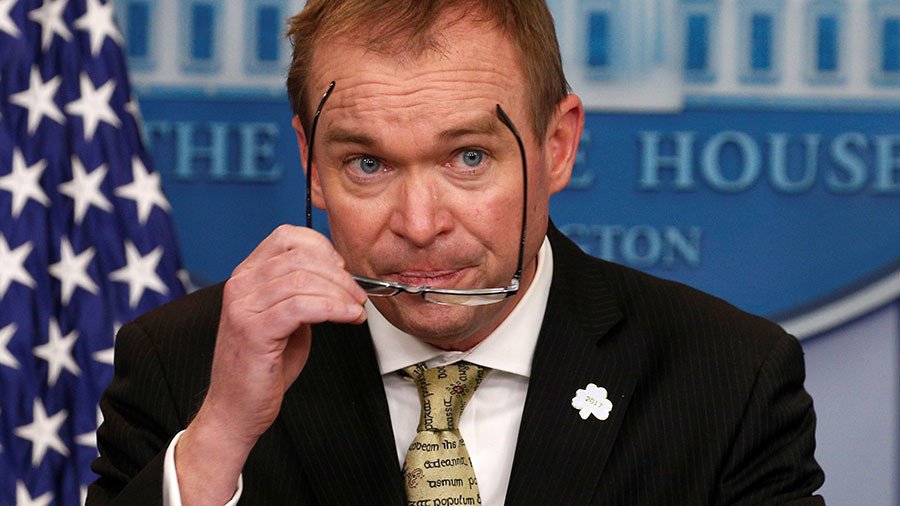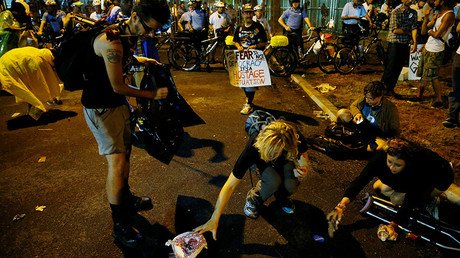Mulvaney immediately issues 30-day hiring freeze at consumer watchdog

Straight after taking charge of the Consumer Financial Protection Bureau, White House budget director Mick Mulvaney issued a 30-day hiring freeze and implemented new rules. An Obama-era holdover, however, has filed a lawsuit to thwart the takeover.
Mulvaney imposed new rules and a hiring freeze Monday, after taking over the Consumer Financial Protection Bureau (CFPB) at the behest of President Donald Trump. Mulvaney took over the agency after former CFPB Director Richard Cordray left his role last week.
However, former interim deputy director of the CFPB Laura English, who was appointed as temporary head of the agency by Cordray, filed a lawsuit in US District Court for the District of Washington late Sunday, against Mulvaney’s takeover.
On Monday in Washington DC, English’s case was heard by Federal Judge Timothy J. Kelly, who was previously appointed by President Trump. After the case was heard, Judge Kelly ultimately declined to issue a temporary restraining order against Mulvaney, as was requested by English.
Before Kelly’s decision Monday, Mulvaney said at a press conference that “elections have consequences at every agency, and that includes the CFPB,” the Los Angeles Times reported.
Mulvaney also elaborated on his hiring freeze at the CFPB, adding: “Anything in the pipeline stops for at least 30 days.”
Mulvaney was seen on Monday bringing donuts to his first day on the job at the CFPB.
Mulvaney brings donuts to his first day at CFPB. Couldn’t hurt. pic.twitter.com/BpKJ2nd1L0
— Katie Rogers (@katierogers) November 27, 2017
Cordray had announced that he planned to resign his office by the end of November. He was appointed by President Barack Obama and has been long criticized by Congressional Republicans as overzealous.
English's lawsuit calls on the Trump administration to block the appointment of Mulvaney as interim director. English is seeking an injunction ordering Trump to halt the Mulvaney appointment. The suit argued Mulvaney can’t be director because he already reports directly to the president.
English argued there was a statutory conflict between the Dodd-Frank Act and the Federal Vacancies Reform Act over who has the right to appoint an interim successor at the agency.
“The President may not, consistent with the statutory requirement of independence, install a still-serving White House staffer as the acting head of an independent agency - particularly when doing so would displace an acting head who has a clear legal entitlement to the position,” the lawsuit said.
The Trump administration retorted that there was no statutory conflict, and that the president had every authority to appoint the new agency head.
“The law is clear: Director Mulvaney is the acting director of the CFPB,” White House press secretary Sarah Huckabee Sanders said in a statement.
Public Citizen president Rob Weissman: Mick Mulvaney wants to come in and prevent the @CFPB from doing what it is intended to do. We must defend consumers and #DefendCFPB. pic.twitter.com/pQNTcR10JC
— Public Citizen (@Public_Citizen) November 27, 2017
CFPB’s general counsel, Mary McLeod, drafted a memo supporting the Trump administration’s position.
“I advise all Bureau personnel to act consistently with the understanding that Director Mulvaney is the acting director of the CFPB,” McLeod wrote, according to the American Banker.
The CFPB director is supposed to be shielded from politics because of the judicial and law enforcement functions of the job, which involve filing enforcement actions and deciding appeals. The CFPB get its funding from the Federal Reserve and its director is giving significant leverage to go after what he or she considers important.
The Dodd-Frank Act, which created the CFPB, explicitly specified the role of the president. It states that the president can nominate a CFPB director who is confirmed by the Senate and can only fire the director “for cause.” It said nothing about the director resigning, however.
Under the leadership of Cordray, its first director, the CFPB implemented and proposed new rules and regulations for the banking industry. The agency also took legal action against banks, mortgage companies, credit issuers, payday lenders, debt collectors and others, and extracted billions in settlement. When Wells Fargo was found to have opened millions of phony accounts for its customers, the CPFB fined the bank $100 million, the agency’s largest penalty to date.














